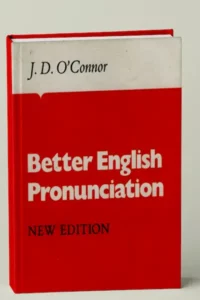Better English Pronunciation is the new edition of a highly successful and widely used text on pronunciation.
It provides a systematic and thorough introduction to the pronunciation of English to help intermediate and more advanced students improve their production of the spoken language.
Better English Pronunciation
The purpose of this book is very simple: to help you, the reader, to pronounce English better than you do now. Millions of foreign students want to learn English as well as they can; for some it is only a matter of reading and writing it, and they will fmd no help here.
But many students want to be able to speak English well, with a pronunciation which can be easily understood both by* their fellow-students and by English people, and it is for them that this book is specially intended. Written English and spoken English are obviously very different things.
Writing consists of marks on paper which make no noise and are taken in by the eye, whilst speaking is organized sound, taken in by the car. How can a book, which is nothing but marks on paper, help anyone to make their English sound better?
The answer to this is that it can’t, not by itself. But if you will co-operate, and listen to English as much as you an, along the lines that I shall suggest to you, then you will find that the instructions given in the following pages will make your ears sharper for the sound of English and when you can hear English properly you can go on and improve your performance. Language starts with the car.
When a baby starts to talk he does it by hearing the sounds his mother makes and imitating them. If a baby is born deaf he cannot hear these sounds and therefore cannot imitate them and will not speak.
But normal babies can hear and can imitate; they arc wonderful imitators, and this gift of imitation, which gives us the gift of speech, lasts for a number of years. It is well known that a child of ten years old or less can learn any language perfectly, if it is brought up surrounded by that language, no matter where it was born or who its parents were.
But after this age the ability to imitate perfectly becomes less, and we all know only too well that adults have great difficulty in mastering the pronunciation (as well as other parts) of foreign languages. Some people are more talented than others; they find pronouncing other languages less difficult, but they never fmd them easy.
Why is this? Why should this gift that we all have as children disappear in later life? Why can’t grown-up people pick up the characteristic sound of a foreign language as a child can?
The answer to this is that our native language won’t let us. By the time we arc grown up the habits of our own language are so strong that they are very difficult to break. In our own language we have a fairly small number of sound-units which we put together in many different combinations to form the words and sentences we use every day. And as we get older we are dominated by this small number of units.
It is as if we had in our heads a certain fixed number of boxes for sounds; when we listen to our own language we hear the sounds and we put each into the right box, and when we speak we go to the boxes and take out the sounds we want in the order we want them.
And as we do this over the years the boxes get stronger and stronger until every-thing we hear, whether it is our own language or another, has to be put into one of these boxes, and everything we say comes out of one of them. But every language has a different number of boxes, and the boxes are arranged differently.


